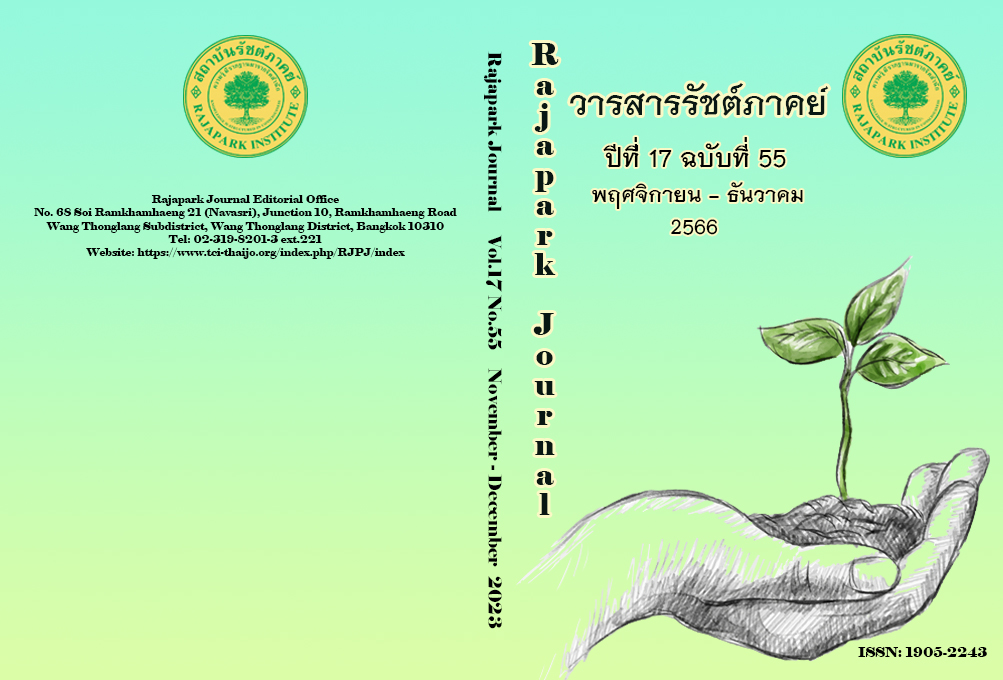The Development of Online Learning Management Model Based on the Concept of Gamification for Elementary School Teachers
Main Article Content
Abstract
The purpose of this study was to 1) develop a gamification-based online learning model and 2) evaluate the effectiveness of the gamification-based online learning model for elementary school teachers. The participants were 10 experts and 30 teachers. The research instruments were questionnaires, online learning activity plans, and gamification webs. The data collection instruments were assessment forms and attitude measurement forms. The results of the study found that the model consists of six components: 1) the role of the teacher; 2) the role of the learner; 3) the learning process; 4) gamification; 5) the learning support system; and 6) authentic assessment. The important steps are as follows: 1) Elicitation Phase; 2) Engagement with Gamification; 3) Learning Procedure Tool; 4) Create Work; 5) Summarized; and 6) Authentic Assessment of Learning. The results of the pilot study found that 1) elementary school teachers had higher knowledge in designing online learning management after learning than before using the model; 2) elementary school teachers had a higher ability to design online learning after learning than before using the model; and 3) elementary school teachers had a good attitude towards using the gamification-based online learning model in teaching.
Article Details

This work is licensed under a Creative Commons Attribution-NonCommercial-NoDerivatives 4.0 International License.
Views and opinions appearing in the Journal it is the responsibility of the author of the article, and does not constitute the view and responsibility of the editorial team.
References
Aksorn Education. (2023). Summarize directions and perspectives of study from World Economic Forum. https://www.aksorn.com/al-directions-educational-2023
Bangthamai, E. (2018a). The development of instructional activities model by problems based learning to enhance problem solving abilities on digital photography for undergraduate students faculty of education, Silpakorn University courses. Veridian E-Journal, Silpakorn University, 11(1), 11-40.
Bangthamai, E. (2018b). Research report on the development of e-learning models using inquiry-based learning and project-based learning to improve learning performance and photography skills for undergraduate students. Faculty of Education, Silpakorn University.
Berger, J. (2014). Contagious: Why things catch on. Simon & Schuster.
Cowell, P. (2021). COVID-19 has transformed education here are the 5 innovations we should keep. https://www.weforum.org/agenda/2021/02/covid-19-pandemic-higher-education-online-resources-students-lecturers-learning-teaching.
Domínguez, A., Saenz-de-Navarrete, J., de-Marcos, L., Fernandez-Sanz, L., Pagés, C., & Martínez, J.J. (2013). Gamifying learning experiences: Practical implications and outcomes. Computers & Education, 63(1), 380-392. DOI:10.1016/j.compedu.2012.12.020
Jongmuenwai, B., Kongsrima, K., Prachai, S., Jabjone, S., & Suikraduang, A. (2018). Gamification for learning. Journal of Project in Computer Science and Information Technology, 4(2), 34-43.
Kapp, K. M. (2012). The gamification of learning and instruction: Game-based methods and strategies for training and education. Pfeiffer.
Keeves, P. J. (1988). Model and model building: educational research, methodology and measurement. Pergamon.
McGonigal, J. (2011). Reality is broken: Why games make us better and how they can change the world. Penguin.
Office of the Basic Education Commission. (2020). Guidelines for school teaching and learning during the COVID-19 pandemic situation. https://www.obec.go.th/archives/255396
Pappas, C. (2013). The gamification of learning and instruction: A review of the literature. In M. Spector, M. Merrill, J. van Merriënboer, & M. Driscoll (Eds.), Handbook of research on educational communications and technology (4th ed.), (653-675). Springer.
Pimolsaengsuriya, A. (2023). 6 Steps in Skill and Ability Development. https://www.slingshot.co.th/blog/6-skills-for-development
Pinyosinwat, S. (2020). The challenges of education in Thailand. Chulalongkorn University.
Rattanawongsa, R. (2016). Development of an instructional model in gamified learning environment with design-based learning and visual tools to enhance visual literacy and achievement motivation for undergraduate students[Doctoral dissertation, Chulalongkorn University].
Ritter, S., Cody, M., & Vorderer, P. (2013). Gamification: A look at the empirical evidence. In M. Vorderer, U. Klimmt, & J. H. Hamari (Eds.), Playing computer games: Motives, responses, and consequences (191-210). Routledge.
Rungchareonkiat, D. (2022). Development of gamification learning environment model using design-based learning to enhance innovative thinking of undergraduate students in education. Journal of Research and Curriculum Development, 12(2), 39-47. https://so03.tci-thaijo.org/index.php/jrcd/article/view/262448
Sefriani, R., Sepriana, R., Wijaya, I., Radyuli, P., & Menrisal, M. (2021). Blended learning with Edmodo: The effectiveness of statistical learning during the COVID-19 pandemic. International Journal of Evaluation and Research in Education (IJERE), 10(1), 293-299. DOI: 10.11591/ijere.v10i1.20826


